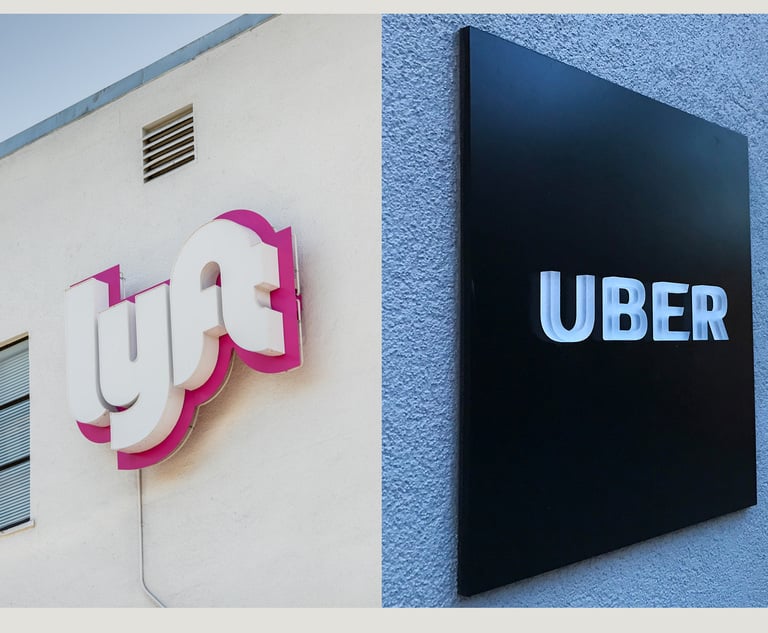 Ian Shaw of Brewer Attorneys and Counselors.
Ian Shaw of Brewer Attorneys and Counselors.Three Things Litigators Must Do During COVID-19
To continue to adhere to the calling that requires litigators to be the custodians of the ideals of our society, there are a few things litigators must do in order to uphold that calling during this global pandemic.
April 14, 2020 at 05:28 PM
5 minute read
Litigators are dispute solvers. They are called upon to settle disputes and make problems go away. A global pandemic has swarmed across the globe and although disputes are still prevalent, clients and their attorneys are adjusting on how to solve them. Litigators are being put on the spot to deal with an economy that is on its heels and a legal industry that is fighting to remain strong. To continue to adhere to the calling that requires litigators to be the custodians of the ideals of our society, there are a few things litigators must do in order to uphold that calling during this global pandemic.
|Litigators Must Be Closers
The best hat litigators can wear right now is their closer hat. More than ever, litigators must be closers. Clients are losing money because the economy is taking a downturn and it is unknown when the economy will bounce back. Clients are in complete shock and disarray. They are looking to get rid of lawsuits and focus solely on business operations. Litigators must take heed to this.
During this time, litigators should be trying to settle many of their pending cases. The art of lawyering is centered on helping clients solve their problems as efficiently and quickly as possible. Although some cases, due to the complexity of the case, take longer than others to solve, the foundation of a litigator's duty is to solve the dispute—be a closer. During these times, calling opposing counsel and coming to the table to discuss solutions is the act of an effective closer.
With backed-up court dockets and trial delays, courts will appreciate the notion that litigators are using civility and settling disputes outside the courtroom. Although legal disputes are still arising, judges across this nation are counting on litigators to be closers.
|Litigators Must Be Efficient
COVID-19 has taught the nation more than the importance of washing one's hands. It has taught—in many ways—the laws of how to be efficient. Nearly every law firm has become remote and all the attorneys are working from home. At home, attorneys are juggling kids, family time and work. And work is a time-consuming job. It's a job that requires a lot of strategy, planning, reading, analyzing, writing, rewriting and editing. All of which require an environment that lends itself to silence. So how are attorneys juggling life and work under one roof? It's simple—be efficient. And being efficient requires litigators to use one commodity effectively: time.
President Abraham Lincoln once said, "A lawyer's time and advice are his stock in trade." During this time, litigators can trim the excess of their cases and focus on the meat—the viable claims. There isn't much time to continue to drag on pending cases to search for new far-fetched claims. Time will more wisely used analyzing the claims as they are and strategizing on how to best advocate for the client effectively. Litigators must use this time to manage communications with clients. This may require early mornings before the kids wake up or late evenings when the kids are settled in bed. Clients need to be kept abreast of the events that occur during a pending matter, especially now. Concise emails and quick phone calls relaying occurred events or new findings are ways to keep the client informed, and they are time efficient when done consistently. Furthermore, this time should be used to get ahead on several assignments. In analyzing a case, there is potential that a motion to compel may be coming or a motion to dismiss may be in the pipeline. Get ahead of it. Begin research now. Start drafting now. Frontload a lot of the work now so that your time will be better used later. Keep in mind during this pandemic, billables will be affected, yet the firm's bills must get paid. Efficiency matters.
|Litigators Must Use Discovery
There is one thing that the courts do not need to be involved in that litigators should use to their advantage and that's serving discovery. Serving requests for admissions, requests for production, interrogatories, and taking depositions are perfect ways to use this time effectively. There are several answers that can derive from succinct and clear RFAs. Facts and possible deponents can derive from clearly stated Interrogatories. Responsive documents from RFPs helps provide the proof necessary to either establish one's claims or establishing one's affirmative defenses. Depositions may be difficult to do during the social distancing, but it is still an effective way to gather valuable information via tools like Zoom.
Discovery will call for litigators to act with civility and patience. Discovery is not a new process, but it will be leaned on more than before. Meet and confers will need to be more frequent. Objections will need to be used effectively rather than frivolously. Parties—although adverse to one another—must work together to protect the civility of the legal profession and the laws that govern discovery.
Litigators must be patient with one another. This may not be the advice one would seek who is averse to another, yet these times require it. Clients may have trouble accessing documents to respond to a RFP, or a third party may not have a quiet room to get deposed. These are scenarios to keep in mind. The art of litigating and the competition in which it breeds does not need to die, but not at the sake of civility. As custodians of society's laws, lawyers must use this time to be effective and efficient, while not losing the zeal that is required in the art of litigation.
Ian Shaw is an associate with Brewer, Attorneys & Counselors, where he handles high-stakes, complex litigation.
This content has been archived. It is available through our partners, LexisNexis® and Bloomberg Law.
To view this content, please continue to their sites.
Not a Lexis Subscriber?
Subscribe Now
Not a Bloomberg Law Subscriber?
Subscribe Now
NOT FOR REPRINT
© 2024 ALM Global, LLC, All Rights Reserved. Request academic re-use from www.copyright.com. All other uses, submit a request to [email protected]. For more information visit Asset & Logo Licensing.
You Might Like
View All
Revisiting the Boundaries Between Proper and Improper Argument: 10 Years Later
8 minute read
'Serious Disruptions'?: Federal Courts Brace for Government Shutdown Threat
3 minute read
Uber Not Responsible for Turning Over Information on 'Dangerous Riders' to Competitor, Judge Finds
5 minute read
Infant Formula Judge Sanctions Kirkland's Jim Hurst: 'Overtly Crossed the Lines'
4 minute readTrending Stories
- 1'Largest Retail Data Breach in History'? Hot Topic and Affiliated Brands Sued for Alleged Failure to Prevent Data Breach Linked to Snowflake Software
- 2Former President of New York State Bar, and the New York Bar Foundation, Dies As He Entered 70th Year as Attorney
- 3Legal Advocates in Uproar Upon Release of Footage Showing CO's Beat Black Inmate Before His Death
- 4Longtime Baker & Hostetler Partner, Former White House Counsel David Rivkin Dies at 68
- 5Court System Seeks Public Comment on E-Filing for Annual Report
Who Got The Work
Michael G. Bongiorno, Andrew Scott Dulberg and Elizabeth E. Driscoll from Wilmer Cutler Pickering Hale and Dorr have stepped in to represent Symbotic Inc., an A.I.-enabled technology platform that focuses on increasing supply chain efficiency, and other defendants in a pending shareholder derivative lawsuit. The case, filed Oct. 2 in Massachusetts District Court by the Brown Law Firm on behalf of Stephen Austen, accuses certain officers and directors of misleading investors in regard to Symbotic's potential for margin growth by failing to disclose that the company was not equipped to timely deploy its systems or manage expenses through project delays. The case, assigned to U.S. District Judge Nathaniel M. Gorton, is 1:24-cv-12522, Austen v. Cohen et al.
Who Got The Work
Edmund Polubinski and Marie Killmond of Davis Polk & Wardwell have entered appearances for data platform software development company MongoDB and other defendants in a pending shareholder derivative lawsuit. The action, filed Oct. 7 in New York Southern District Court by the Brown Law Firm, accuses the company's directors and/or officers of falsely expressing confidence in the company’s restructuring of its sales incentive plan and downplaying the severity of decreases in its upfront commitments. The case is 1:24-cv-07594, Roy v. Ittycheria et al.
Who Got The Work
Amy O. Bruchs and Kurt F. Ellison of Michael Best & Friedrich have entered appearances for Epic Systems Corp. in a pending employment discrimination lawsuit. The suit was filed Sept. 7 in Wisconsin Western District Court by Levine Eisberner LLC and Siri & Glimstad on behalf of a project manager who claims that he was wrongfully terminated after applying for a religious exemption to the defendant's COVID-19 vaccine mandate. The case, assigned to U.S. Magistrate Judge Anita Marie Boor, is 3:24-cv-00630, Secker, Nathan v. Epic Systems Corporation.
Who Got The Work
David X. Sullivan, Thomas J. Finn and Gregory A. Hall from McCarter & English have entered appearances for Sunrun Installation Services in a pending civil rights lawsuit. The complaint was filed Sept. 4 in Connecticut District Court by attorney Robert M. Berke on behalf of former employee George Edward Steins, who was arrested and charged with employing an unregistered home improvement salesperson. The complaint alleges that had Sunrun informed the Connecticut Department of Consumer Protection that the plaintiff's employment had ended in 2017 and that he no longer held Sunrun's home improvement contractor license, he would not have been hit with charges, which were dismissed in May 2024. The case, assigned to U.S. District Judge Jeffrey A. Meyer, is 3:24-cv-01423, Steins v. Sunrun, Inc. et al.
Who Got The Work
Greenberg Traurig shareholder Joshua L. Raskin has entered an appearance for boohoo.com UK Ltd. in a pending patent infringement lawsuit. The suit, filed Sept. 3 in Texas Eastern District Court by Rozier Hardt McDonough on behalf of Alto Dynamics, asserts five patents related to an online shopping platform. The case, assigned to U.S. District Judge Rodney Gilstrap, is 2:24-cv-00719, Alto Dynamics, LLC v. boohoo.com UK Limited.
Featured Firms
Law Offices of Gary Martin Hays & Associates, P.C.
(470) 294-1674
Law Offices of Mark E. Salomone
(857) 444-6468
Smith & Hassler
(713) 739-1250






